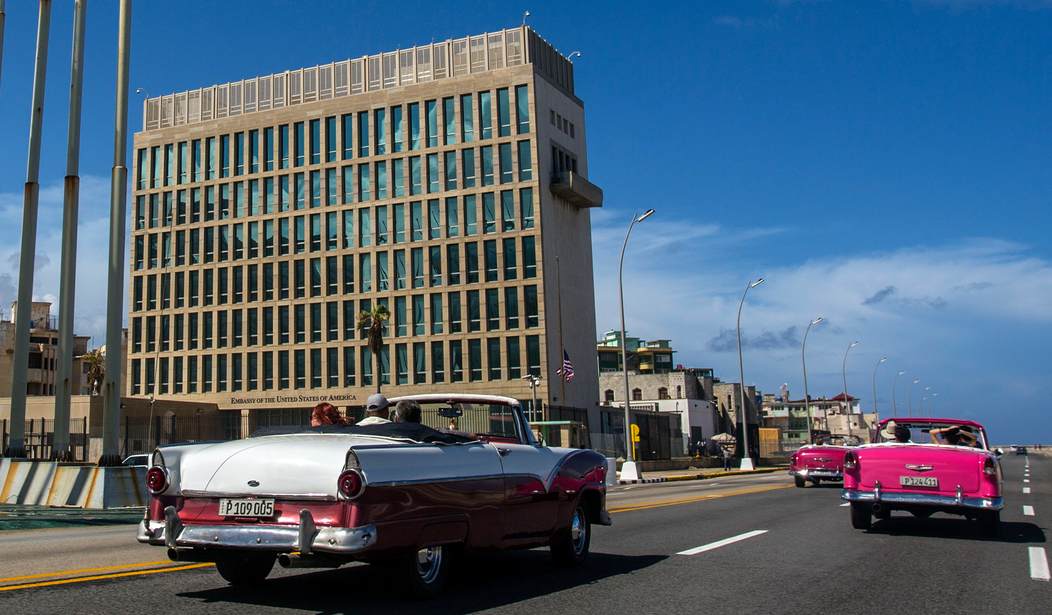When reports of “Havana Syndrome” first began to surface several years ago, it sounded like something out of a Tom Clancy thriller — the mysterious ear ringing, pain, memory loss, dizziness, nausea, following strange grating noises and vibrations experienced by U.S. and Canadian Embassy staff in Havana, Cuba, surely must have been the result of a targeted attack of some sort. Microwave weapons were suspected. That first incident (for which the syndrome was named) involved 21 diplomatic personnel in late 2016. Later, similar reports emerged in China, India, and even Washington D.C., and involved U.S. military and intelligence personnel and their families.
Now, the U.S. Intelligence Community has determined that the curious affliction likely was not due to the actions of a foreign adversary. Per the Washington Post:
The new intelligence assessment caps a years-long effort by the CIA and several other U.S. intelligence agencies to explain why career diplomats, intelligence officers and others serving in U.S. missions around the world experienced what they described as strange and painful acoustic sensations. The effects of this mysterious trauma shortened careers, racked up large medical bills and in some cases caused severe physical and emotional suffering.
…
Seven intelligence agencies participated in the review of approximately 1,000 cases of “anomalous health incidents,” the term the government uses to describe a constellation of physical symptoms including ringing in the ears followed by pressure in the head and nausea, headaches and acute discomfort.
Five of those agencies determined it was “very unlikely” that a foreign adversary was responsible for the symptoms, either as the result of purposeful actions — such as a directed energy weapon — or as the byproduct of some other activity, including electronic surveillance that unintentionally could have made people sick, the officials said. They spoke on the condition of anonymity to describe the findings of the assessment, which had not yet been made public.
One agency, which the officials did not name, determined that it was “unlikely” that a foreign actor was at fault, a slightly less emphatic finding that did not appreciably change the consensus. One agency abstained in its conclusion regarding a foreign actor. But when asked, no agency dissented from the conclusion that a foreign actor did not cause the symptoms, one of the intelligence officials said.
On Wednesday, the House Permanent Select Committee on Intelligence (HPSCI) issued a joint statement from Chairman Mike Turner (R-OH) and Ranking Member Jim Himes (D-CT), in response to the Intelligence Community Assessment of these “Anomolous Health Incidents”:
“In the past two Congresses, the Intelligence Committee has engaged in intensive and bipartisan oversight of anomalous health incidents. We have focused on efforts both to understand what is causing these incidents and to support the individuals who have suffered. In the course of that work, Committee Members and staff have met with many victims and others involved in the associated investigations, heard their candid and compelling stories, and committed our support.
“The Intelligence Community has now completed a coordinated assessment regarding the cause of these incidents and has stated publicly that it has been unable to find a clear link to any foreign adversary or other outside actor who may have injured our personnel. We will seek to ensure the review was conducted with the highest degree of analytical rigor and that it considered all the available intelligence and perspectives, documenting all substantial differences in analysis. The Committee will take a skeptical approach and test the assumptions of the IC, as our oversight requires.
“As the Committee further reviews the intelligence community’s work, we remain committed to four core principles.
“First, there can be no backsliding in the care and support we provide to our workforce. Congress enacted the HAVANA Act to expand benefits for those who have experienced AHIs, and we are closely monitoring that process to ensure it proceeds in accordance with the intent of the law.
“Second, there should be no change to processes established within the IC, the State Department, the Department of Defense, and elsewhere in the federal government to intake AHI reports, conduct the appropriate follow-on investigations, and direct individuals to care and support. Those who have come forward—as they were asked to do—should be treated with respect and they should be heard.
“Third, the investigation of AHIs has led to significant new focus in understanding the potential dangers and evolving challenges faced by the men and women of the Intelligence Community, the Department of Defense, and other agencies. That work should continue, recognizing that these challenges will endure.
“Finally, the Committee expects Intelligence Community leadership to continue to assess the causes of these incidents, collect reports, and to modify its conclusions as appropriate on the basis of any new evidence or analysis.”
The report itself (or, at least, the Unclassified version released) is brief — just eight pages. The key findings include:
- Five agencies judge that available intelligence consistently points against the involvement of US adversaries in causing the reported incidents. Agencies employed an array of collection and investigative efforts that spanned hundreds ofreported incidents–within the United States and abroad–and explored a range of potential indicators of hostile activity, from identifying suspicious persons near incident sites to searching for a pattern among affected personnel. These efforts could not identify an adversary as being responsible for any incident and in some key cases, IC agencies and partners had comprehensive information on the location where an AHI occurred but found no evidence of adversary activity. Most IC agencies judge it is very unlikely a foreign adversary played a role, although confidence in the judgment related to this line of inquiry varies, with two agencies having moderate-to-high confidence; three agencies having moderate confidence; and one agency abstaining. One agency judges it is only unlikely a foreign adversary played a role and has only low confidence in this judgment. This reflects its view that the evidence is less compelling because the IC has failed to detect some adversaries’ activities.
- A review of intelligence reporting, open-source information, and scientific and medical literature about foreign weapons and research programs, as well as engagement with researchers inside and outside the US Government have led IC agencies to judge that there is no credible evidence that a foreign adversary has a weapon or collection device that is causing AHIs. As a result, most agencies assess that deliberate causal mechanisms are very unlikely to have caused the sensory phenomena and adverse symptoms associated with AHIs but with varying confidence levels. Two agencies have high confidence in this judgment while three agencies have moderate confidence. Two agencies judge that deliberate causal mechanisms are unlikely to have caused AHIs and have low confidence because they judge that radiofrequency (RF) energy is a plausible cause for AHIs, based in part on the findings of the IC Expert Panel and the results of research by some US laboratories. All agencies acknowledge the value of additional research on potential adversary capabilities in the RF field, in part because there continues to be a scientific debate on whether this could result in a weapon that could produce the symptoms seen in some of the reported AHI cases.
- IC agencies assess that medical analysis of AHIs has evolved since the first reported incidents in ways that point away from adversary involvement. While initial medical studies concluded AHIs represented a novel medical syndrome or consistent pattern of injuries similar to traumatic brain injury (TBI), a combination of medical and academic critiques pointed to methodological limitations in that work. Furthermore, the JASON panel’s review of preliminary data from a National Institutes of Health (NIH) longitudinal study on AHIs in 2021 does not convey a consistent set of physical injuries, including neurologic injuries such as TBI. This shift is notable because the initial medical opinions formed a central part of the IC hypothesis that US personnel had sustained injuries that were unlikely to be explained by natural or environmental factors and shaped the IC’s approach to AHIs. Medical research is ongoing but currently appears consistent with the conclusions emerging from the IC’s analysis of foreign involvement and potential causal mechanisms. Five agencies have moderate confidence in this judgment while one agency abstains. One agency has low confidence because the NIH findings have yet to be published.
Unfortunately, these findings leave those who have been afflicted with Havana Syndrome with numerous unanswered questions. As WaPo notes:
The new intelligence report may represent the official word on the strange health ailment, but it probably won’t be the last word on the matter.
Representatives and lawyers for people suffering with symptoms lambasted the new report as incomplete and opaque. They called on intelligence agencies to disclose more information about how they reached their conclusions and to investigate other leads they said remained poorly examined.














Join the conversation as a VIP Member